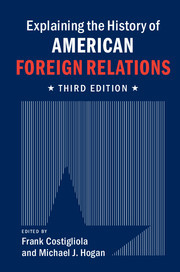Description
Explaining the History of American Foreign Relations (3rd Ed.)
Coordinators: Costigliola Frank, Hogan Michael J.
This volume presents substantially revised and new essays on methodology and approaches in foreign and international relations history.
Language: English
Subject for Explaining the History of American Foreign Relations:
Publication date: 03-2016
398 p. · 15x22.6 cm · Paperback
398 p. · 15x22.6 cm · Paperback
Description
/li>Contents
/li>Biography
/li>
A longtime classic in its first and second editions, Explaining the History of American Foreign Relations, 3rd edition presents substantially revised and new essays on traditional themes such as national security, corporatism, borderlands history, and international relations theory. The book also highlights such innovative conceptual approaches and analytical methods as computational analysis, symbolic borders, modernization and technopolitics, nationalism, non-state actors, domestic politics, exceptionalism, legal history, nation branding, gender, race, political economy, memory, psychology, emotions, and the senses. Each chapter is written by a highly respected scholar in the field, many of whom have risen to prominence since the second edition's publication. This collection is an indispensable volume for teachers and students in foreign relations history, international relations history, and political science. The essays are written in accessible, jargon-free prose, thus also making the book appropriate for general readers seeking an introduction to history and political science.
Introduction Frank Costigliola and Michael J. Hogan; 1. Theories of international relations Robert Jervis; 2. National security Melvyn P. Leffler; 3. Corporatism: from the new era to the age of development Michael J. Hogan; 4. Explaining political economy Brad Simpson; 5. Diplomatic history after the Big Bang: using computational methods to explore the infinite archive David Allen and Matthew Connelly; 6. Development and technopolitics Nick Cullather; 7. Nonstate actors Barbara Keys; 8. Legal history as foreign relations history Mary L. Dudziak; 9. Domestic politics Fredrik Logevall; 10. Global frontier: comparative history and the frontier-borderlands approach Nathan Citino; 11. Crossing borders Emily S. Rosenberg; 12. The privilege of acting upon others: the Middle Eastern exception to anti-exceptionalist histories of the US and the world Ussama Makdisi; 13. Nationalism as an umbrella-ideology Michael H. Hunt; 14. Nation branding Jessica C. E. Gienow-Hecht; 15. Shades of sovereignty: racialized power, the United States, and the world Paul A. Kramer; 16. Gendering American foreign relations Judy Tzu-Chun Wu; 17. The religious turn in diplomatic history Andrew Preston; 18. The senses Andrew J. Rotter; 19. Psychology Richard H. Immerman and Lori Helene Gronich; 20. Reading for emotion Frank Costigliola.
Frank Costigliola is a professor in the Department of History at the University of Connecticut. His books include Roosevelt's Lost Alliances, which won the Society for Historians of American Foreign Relations' Robert H. Ferrell prize for best book. He has received fellowships from the Institute for Advanced Study at Princeton, the National Endowment for the Humanities, the Guggenheim Foundation, the Norwegian Nobel Institute, and the University of Connecticut Humanities Institute.
Michael J. Hogan is Distinguished Professor of History at the University of Illinois, Springfield. He is the author or editor of ten books, including Origins of the National Security State and the Legacy of Harry S. Truman, co-edited with Mary Ann Heiss. Hogan is also the recipient of the Beer Prize of the American Historical Association, the Wright Prize of the International Studies Association, and the Society for Historians of American Foreign Relations' Bernath Prize.
Michael J. Hogan is Distinguished Professor of History at the University of Illinois, Springfield. He is the author or editor of ten books, including Origins of the National Security State and the Legacy of Harry S. Truman, co-edited with Mary Ann Heiss. Hogan is also the recipient of the Beer Prize of the American Historical Association, the Wright Prize of the International Studies Association, and the Society for Historians of American Foreign Relations' Bernath Prize.
© 2024 LAVOISIER S.A.S.
These books may interest you

War and Revolution in Vietnam 160.25 €



